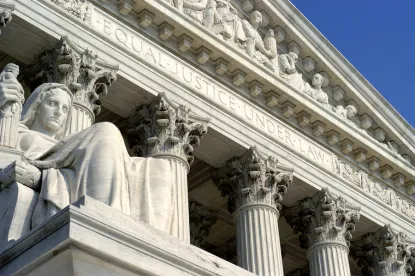Does a “call placed in violation of the Telephone Consumer Protection Act, without any allegation or showing of injury—even that plaintiffs heard the phone ring—suffice to establish concrete injury for purposes of Article III [of the Constitution?]” Recently, Dish Network petitioned the Supreme Court to resolve this question and overturn a verdict rendered by a North Carolina federal jury that was later trebled to $61 million and upheld by the United States Court of Appeals for the Fourth Circuit. Briefing on Dish Network’s petition is now complete and we now await the Court’s decision on whether it will review the case.
Background
In Krakauer v. Dish Network LLC, No. 14-0333 (M.D.N.C.), which we previously wrote about here, the plaintiff alleged that he had received telemarketing sales calls from an authorized dealer of Dish despite registering his number on the National Do Not Call Registry. He further alleged that these calls continued even after his telephone number was placed on both Dish’s and its authorized retailer’s internal Do Not Call Lists. After a week-long trial, the jury found Dish liable and awarded $400 for each call placed by Dish’s authorized retailer. With over 51,000 calls at issue, the jury award amounted to over $20 million across a class of 18,000 members, irrespective of whether the class member answered or heard the ringing of a call, which the district court tripled on the ground that the violations had been willful. Dish appealed this decision to the Fourth Circuit, arguing in relevant part, that the district court erred in concluding that every class member had established Article III standing. The Fourth Circuit affirmed the decision and Dish subsequently filed its petition to the U.S. Supreme Court.
Dish’s Petition to the U.S. Supreme Court
On October 15, 2019, Dish Network filed its petition for a writ of certiorari arguing that the “Fourth Circuit’s ruling shrinks Article III’s concrete injury requirement to a nullity, and it does so in a context—class action litigation—in which diluting standing requirements is most dangerous.” Specifically, Dish Network asked the Supreme Court to resolve a conflict between federal appellate courts on whether a bare violation of the TCPA is sufficiently concrete to establish injury-in-fact and to address “radically conflicting” approaches taken by the lower courts on the proper application of the Supreme Court’s decision in Spokeo v. Robbins. As for the circuit split, Dish Network compares the Eleventh Circuit’s recent decision in Salcedo v. Hanna, which we reported on here, where the court held that receiving a single unsolicited text message does not amount to the harm required to sustain a TCPA claim to decisions rendered by the Ninth, Third, and Second Circuits that each found that any TCPA violation, regardless of the type of communication, the place in which the communication is received, or the way that the plaintiff interacted with the communication, is sufficient to establish an injury-in-fact.
Respondent Krakauer opposed the petition on November 12, 2019 arguing that, contrary to Dish’s assertion that there exists a “persistent conflict” in the circuits with the Eleventh Circuit on one side and the Ninth, Third, Second, and Fourth Circuits on the other, the Salcedo court followed the Supreme Court’s guidance in Spokeo and distinguished unsolicited text messages with voice calls to residential lines. In other words, the Eleventh Circuit concluded that the receipt of a text message is markedly different from the kinds of communications Congress was concerned with when it enacted the TCPA.
In support of Dish’s petition, Cruise Lines International Association (“CLIA”), a trade association of over 50 cruise lines, some of which have been named as defendants in TCPA cases, filed an amicus brief arguing that “Congress may not confer standing on a plaintiff by legislative fiat—Article III’s standing requirements must be met even where a plaintiff has alleged a technical statutory violation.” CLIA emphasized the circuit split and how some courts of appeal have adopted a generalized analysis in determining whether a plaintiff has shown Article III standing to the point that almost any statutory violation can confer standing.
On November 25, 2019, Dish Network filed its reply brief in support of its petition. In its reply, Dish Network highlights the conflict between Salcedo’s ruling that a bare TCPA violation does not constitute concrete injury and the case at hand where some class members neither heard nor answered any of the calls at issue. In addition, Dish Network stresses the “clear division between ‘courts that ask whether the plaintiff himself suffered actual real-world harm from a statutory violation versus courts that presume such harm when an alleged statutory violation is of the type that tends to implicate the generalized interested protected by the statute at issue.’” Finally, Dish Network emphasizes the importance of its petition in that the issues presented are “certain to recur” in the absence of guidance from the Supreme Court and the issues “are hugely important with regard to an array of federal statutes—and especially so in light of the in terrorem effect of class actions.”




 />i
/>i

